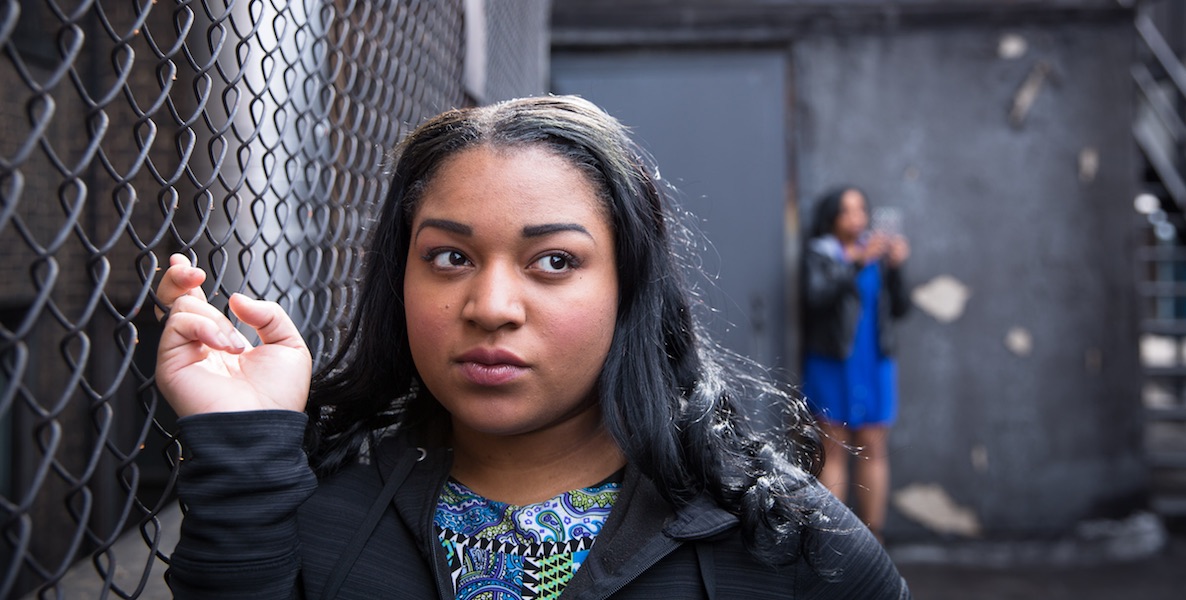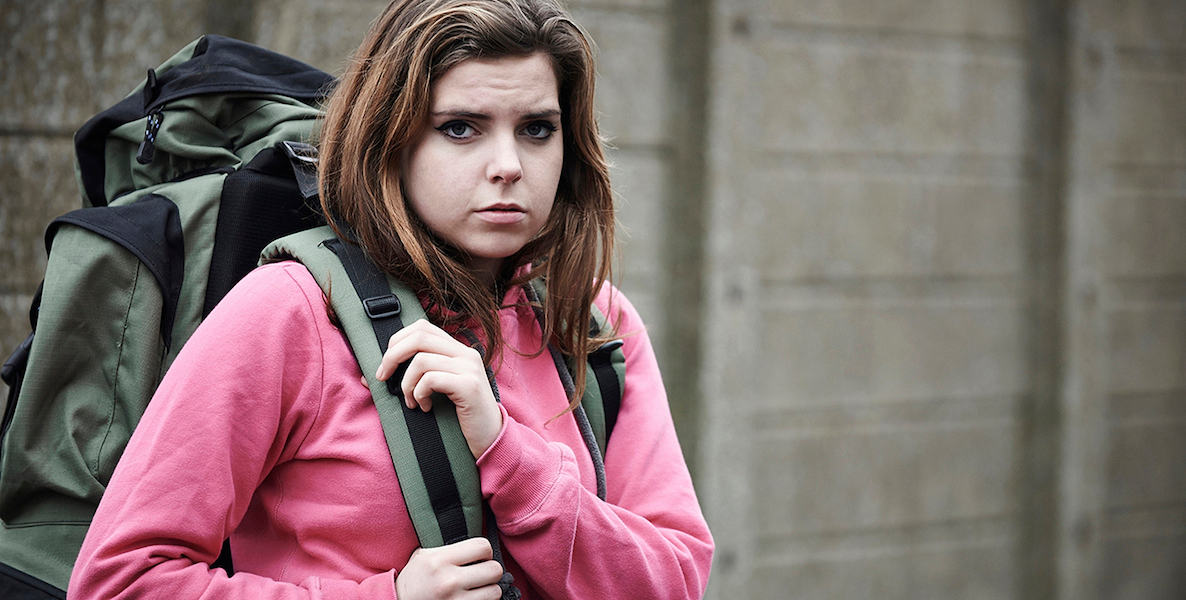At the beginning of I Am Jane Doe, a documentary about the fight to end child sex trafficking, narrator Jessica Chastain lays out the scope and reality of the problem in the United States. Of the 1.6 million runaway and homeless children in the country each year, thousands—could be around 200,000, you learn a bit later—will be sex trafficked, which is, Chastain notes, “a polite term for being repeatedly raped.”
What follows is a complicated, heartwrenching and necessary story about young girls sucked into the world of sex trafficking, their fortunate rescue by their families (because they have them), and their subsequent fight to take down one pillar of the child sex industry: Internet sex ads. The movie, produced in part by Philadelphia’s Joanna Creamer, is difficult to watch; infuriating and agonizing, it shows an underside of American culture that does not deliver easy solutions.
But it is just an opening salvo to a conversation long needed, and avoided, by those of us with the luxury to do so. “The film is now complete, but the work is just beginning,” Creamer says. “Now, hopefully we can get people to act.”
I Am Jane Doe debuts in select theaters—including the AMC at Cherry Hill—on Friday. In April, the filmmakers will release an animated short for children, written by survivors, about how to avoid sex traffickers. Also narrated by Chastain, it’s based on Little Red Riding Hood, and cautions about four ways to get kids off the path. The video will be released widely, in particular for children who are at risk.
Of the 1.6 million runaway and homeless children in the country each year, thousands—could be around 200,000, you learn a bit later—will be sex trafficked, which is, Chastain notes, “a polite term for being repeatedly raped.”
Filmmaker Mary Mazzio—who most recently made Underwater Dreams, about the sons of undocumented Mexican immigrants who build an underwater robot and beat MIT in a national competition—stumbled upon the issue of sex trafficking almost by accident. A former lawyer who lives in Boston, she read an article in the Boston Globe about three unnamed child sex slaves who were attempting to sue backpage.com, a website that trafficking experts says carries 80 percent of the ads for underage sex on the Internet. She had two reactions: “Child sex trafficking, in this country? Are you kidding me?” And: “What’s backpage.com?”
As Mazzio soon learned, backpage.com is a Craigslist-like sales site in some 900 cities, owned by Village Voice Media Holdings, which operated The Village Voice until 2015. It offers users the opportunity to sell the usuals—couches, cars, video games—as well as what it calls “Adult” services. When Craiglist took down its Adult section in 2010, those ads primarily migrated to backpage.com. Sex trafficking experts say those adult listings are teeming with ads for underage youth; one person in Jane Doe describes backpage.com as the “WalMart of human trafficking.” The film estimates the site earned $153.8 million for its owners in 2015, an amount that has more than doubled since 2012.
The few images, partly redacted, that appear in the movie are enough to give the sickening flavor of the listings. And that is even before Mazzio relates the story of three different families from around the country, whose experiences differ only in the particulars. One is the story of 14-year-old M.A., who ran away from home and was immediately caught up with a sex trafficker, who sold her for sex with adults several times a day. Her mother, Kubiiki Pride, found her on backpage.com, and got her back by calling for her services. By then, M.A. was addicted to drugs, a common tactic of traffickers to keep their victims docile and beholden. Traumatized, M.A. ran away twice more; eventually, she was involved in an incident that resulted in her being stabbed, shaved and burned. Her assailants were prosecuted and convicted. But Pride says she could not get backpage.com to take her daughter off the site. So she sued the company for the damage done to her child.

Hers is one of several lawsuits catalogued in I Am Jane Doe, which is less about the gory horrors of sex trafficking and more about the fight over an obscure piece of Congressional legislation that allowed backpage.com to continue running ads from pimps under its Adult category. Section 230 of the Communications Decency Act, passed in the early days of the Internet in 1996, protects web businesses from being liable for materials posted by third parties. In practice, this means that Facebook, for example, is not responsible for slanderous posts about a user’s employer, and Google does not have to answer for the websites that pop up in search results for illegal activities.
But the provision has also afforded backpage.com a protection that most people probably would not support. In jurisdictions across the country, judges have dismissed cases against backpage out of hand because Section 230 does not allow websites to be sued for content posted by customers. It’s a fundamental aspect of Internet freedom that is, as Mazzio puts it, a “thorny thicket.” The Electronic Frontier Foundation and the Center for Democracy and Technology—which is partly funded by Facebook and Google—have filed briefs in support of backpage.com. Those companies, presumably, are not interested in protecting rapists. But they are worried about the slippery slope: If Section 230 is overturned, what would that mean for all the other web companies that allow the general public to express themselves on the Internet?
Both lawyers for the Jane Does and a Congressional subcommittee that has looked into this issue have sidestepped that question a bit by asserting that backpage.com did more than just accept sex ads. They contend the company helped pimps write their advertisements in code, so they didn’t explicitly say they were selling child sex; instead, they used emojis or abbreviations, for example, to indicate the age of their victims. A bipartisan Senate subcommittee, headed by Republican Rob Portman of Ohio, revealed a document from backpage.com that seemed to instruct moderators to be more lax in their judgement of ads; one line said to flag a post only if they were “SURE” it was an underage ad.
The operators of backpage.com have not had to make much of an argument in court, except to deny that they overtly abet sex traffickers. In a hearing before the Senate subcommittee last month, they invoked their 5th Amendment rights to not answer questions—and also the First Amendment. At the same time, they have taken down the Adult ads on the website, replacing it instead with a note that announces it has been “Censored.” (Mazzio says the ads, as they will, have migrated to other sites.)
“Regardless about what’s permissible, the question is, ‘What’s right?’” Covenant House’s Ducoff says near the end of the film. “The question for backpage is: Do you protect kids from trafficking? Or do you profit from their suffering?”
I Am Jane Doe doesn’t grapple fully with the implications of shutting down backpage.com, or reworking Section 230, which may be the only way to put a permanent end to child sex ads on backpage.com and other sites. The lawyer for backpage.com is right when she says the problem of sex trafficking won’t go away because pimps can no longer advertise on the website.
Creamer doesn’t dispute that. A philanthropist who supports several youth-servicing organizations—including Covenant House PA, a program for homeless teens, whose executive director John Ducoff is in the film—Creamer got involved with I Am Jane Doe because she recognized the power of film to spread important messages. She has long understood the breadth of sex trafficking in America; she sees stopping backpage.com as a baby step, and a way in to talking about an issue that we have too often ignored. “We have to look at this and be willing to have difficult conversations about what this means for us as a society, as people who do embrace free speech,” she says. “We have to look at the issue as holistically as possible, and not have it be taboo. If it’s taboo then we just continue to have the problem.”
Mazzio, too, acknowledges the complexity of the issue—the power to speak freely on the Internet is a valuable tool that Section 230 sets out to protect. But she says there must be a middle path. “Backpage isn’t totally responsible,” she says. “But you can’t say it’s not responsible at all. What percentage of culpability do they have? To what extent are these companies responsible?”
The middle path could be as simple (or complicated) as utilizing technology that already exists, for the sake of doing the right thing. Mazzio notes that Google and Facebook track every search she makes, placing a Tory Burch ad in her feed because she looked for shoes online. “Are you telling me you can’t track the sale of children?” she says. “Yes, it becomes thorny when the government demands certain evidence from these big tech companies. But what more can they do to stop children being sold for sex?”
I Am Jane Doe doesn’t answer this question. Instead, it turns on the moral question, which is harder to assail.
“Regardless about what’s permissible, the question is, ‘What’s right?’” Covenant House’s Ducoff says near the end of the film. “The question for backpage is: Do you protect kids from trafficking? Or do you profit from their suffering?”
Correction: A previous version of the story misstated how the executive producer is credited in the film. She is Joanna Creamer.
Header photo by R. Schultz, Courtesy of 50 Eggs






